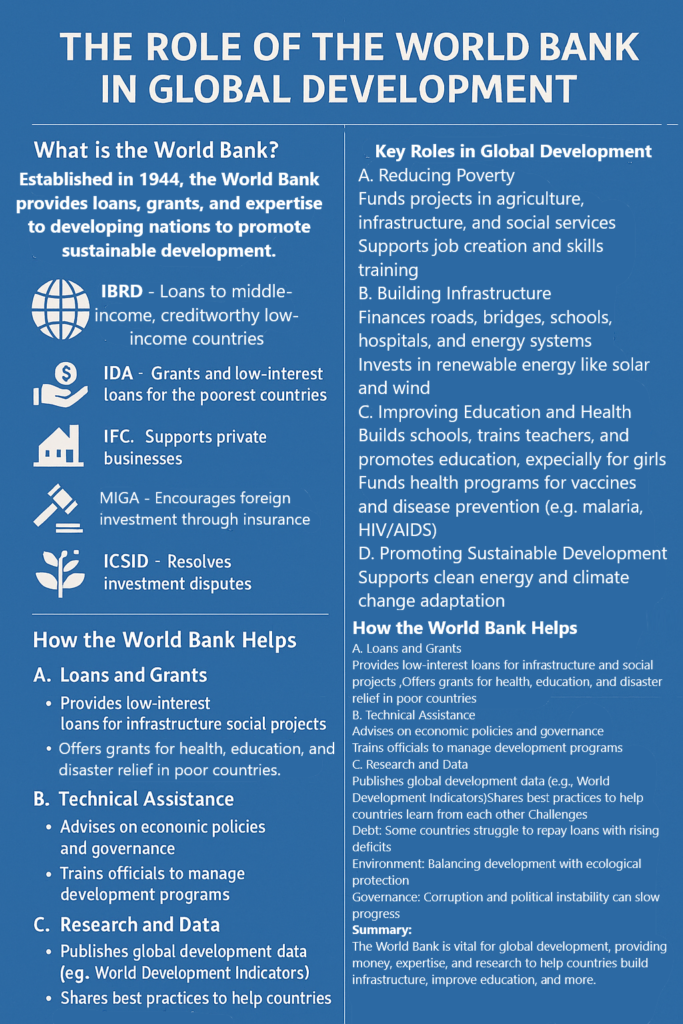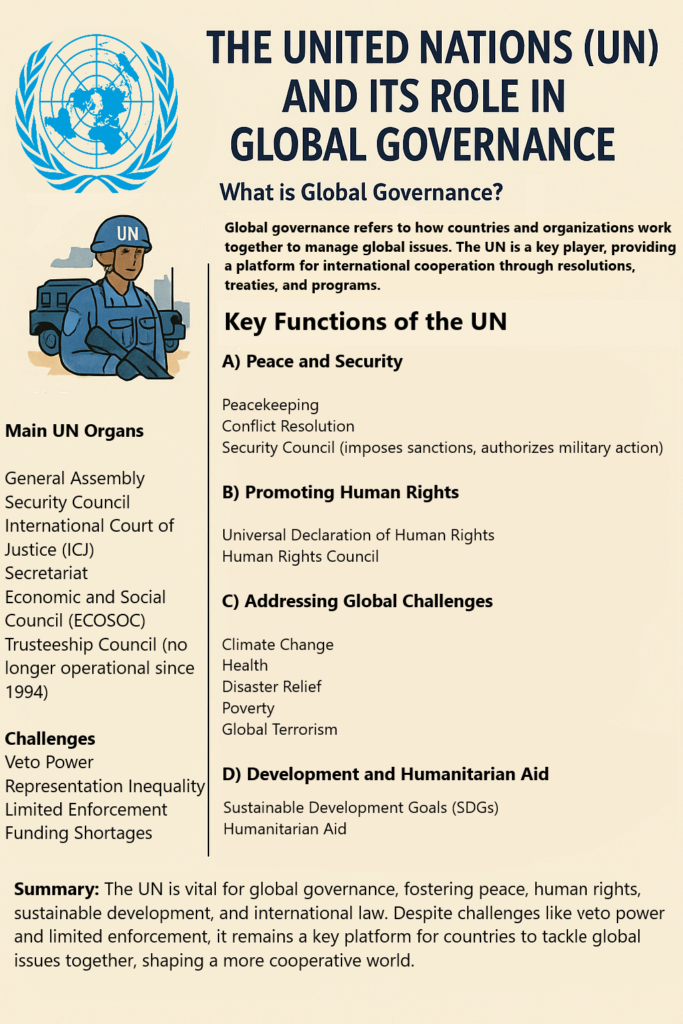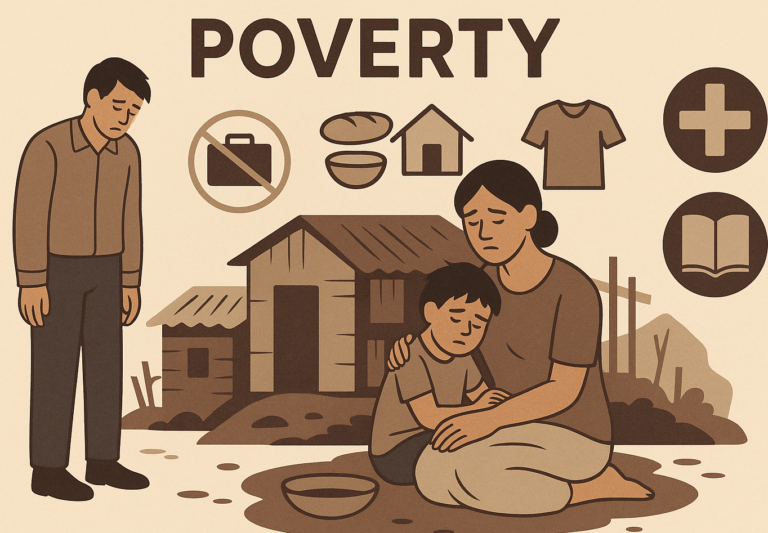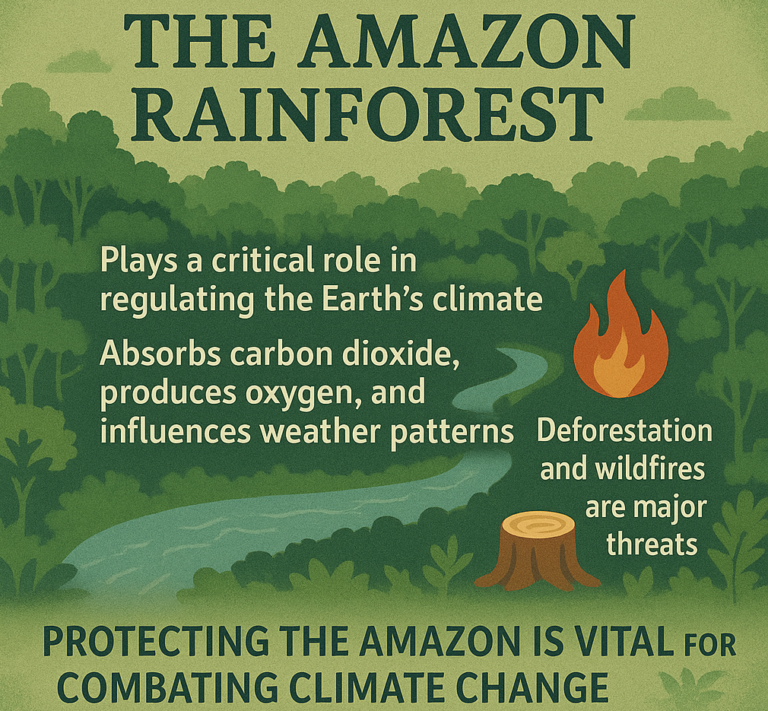The Role of the World Bank in Global Development
The World Bank is one of the most important international financial institutions in the world. It plays a crucial role in global development by providing financial and technical assistance to developing countries to help them build infrastructure, reduce poverty, and improve living standards.

1. What is the World Bank?
The World Bank is a group of five international organizations that provide financial and technical assistance to developing countries. It was established in 1944, after World War II, to help countries rebuild and develop their economies.
The World Bank’s mission is to reduce poverty and promote sustainable economic development. It does this by providing loans, grants, and expertise to support projects that can improve the lives of people in developing countries.
The World Bank Group consists of five institutions:
- International Bank for Reconstruction and Development (IBRD) – Lends money to middle-income countries and creditworthy low-income countries.
- International Development Association (IDA) – Provides concessional loans and grants to the world’s poorest countries.
- International Finance Corporation (IFC) – Supports private sector investment and helps businesses grow.
- Multilateral Investment Guarantee Agency (MIGA) – Provides insurance and guarantees to encourage foreign investment.
- International Centre for Settlement of Investment Disputes (ICSID) – Helps resolve disputes between investors and governments.
2. Key Roles of the World Bank in Global Development
A. Reducing Poverty
One of the World Bank’s main goals is to help reduce poverty. It works with developing countries to support projects that can improve people’s lives and create opportunities for economic growth.
- Poverty Reduction Projects: Funds infrastructure, agriculture, and social service projects essential for lifting people out of poverty.
- Job Creation: Supports economic growth, job creation, and skills development.
B. Building Infrastructure
Infrastructure is the foundation of development. The World Bank helps countries build roads, bridges, schools, hospitals, and energy systems.
- Transportation Infrastructure: Finances roads, bridges, and airports to boost connectivity and trade.
- Energy Projects: Invests in power infrastructure, including renewable energy sources like solar and wind.
C. Promoting Education and Healthcare
The World Bank invests heavily in education and healthcare to improve quality of life and foster development.
- Education: Supports school construction, teacher training, and education access—especially for girls and marginalized groups.
- Healthcare: Funds health programs, vaccines, and disease prevention (e.g., malaria, HIV/AIDS, tuberculosis).
D. Fostering Sustainable Development
The World Bank promotes environmentally sustainable development through clean energy and natural resource conservation projects.
- Climate Change: Supports renewable energy and helps communities adapt to climate impacts.
- Conservation: Funds projects that protect forests, biodiversity, and water resources.
E. Encouraging Private Sector Development
The World Bank fosters economic growth by supporting private businesses and improving the business environment.
- Support for Entrepreneurs: The IFC offers financing and advice to businesses, especially in developing regions.
- Improving Business Environments: Works with governments to reform regulations, strengthen legal systems, and reduce corruption.
3. How Does the World Bank Help?
The World Bank provides support through loans, grants, and advisory services.
A. Loans and Grants
- Loans: Offers low-interest, long-term loans for infrastructure and social services projects.
- Grants: Provides non-repayable financial assistance to the poorest countries for vital needs like health, education, and disaster relief.
B. Technical Assistance and Expertise
Provides governments with expert knowledge and support in designing and implementing effective development strategies.
- Policy Advice: Advises on economic policy, governance, and social development.
- Capacity Building: Trains officials and strengthens institutions to manage development programs.
C. Research and Data Collection
Conducts research and gathers data to help countries make evidence-based decisions.
- World Development Indicators: Publishes global development statistics on education, health, poverty, and the economy.
- Global Knowledge Sharing: Shares best practices and lessons learned to support learning between countries.
4. Challenges Faced by the World Bank
A. Debt Burden on Developing Countries
Some countries struggle to repay World Bank loans, leading to debt crises. The Bank offers programs to help manage debt sustainably.
B. Balancing Development with Environmental Sustainability
Balancing infrastructure development with environmental protection is challenging. The Bank aims to avoid long-term ecological harm.
C. Political and Social Challenges
Issues like corruption, weak governance, and political instability can hinder development efforts. The Bank works to promote good governance and transparency.
5. Conclusion
The World Bank plays a critical role in global development by supporting developing nations through financial aid, expertise, and knowledge sharing. Its focus on infrastructure, healthcare, education, and sustainable practices has helped improve lives worldwide.
Despite ongoing challenges, the World Bank remains a vital force in shaping a more equitable, prosperous, and sustainable future for all.











